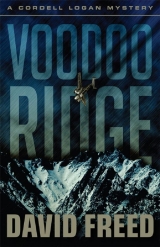
Текст книги "Voodoo Ridge"
Автор книги: David Freed
Жанр:
Триллеры
сообщить о нарушении
Текущая страница: 3 (всего у книги 17 страниц)
“Another cookie?” Marlene said.
“Don’t mind if I do.”
The door opened and Chad came in off the flight line, holding his iPhone to his right ear.
“No, ma’am, I’m not the pilot. I just work here. The pilot’s right here.” He handed me the phone. “El Dorado Sheriff’s Department. They want to talk to you.”
The voice on the other end identified herself as Sergeant Somebody. I didn’t catch her name. She said she was the watch commander on duty. I told her what I’d told Chad, about what I’d seen, and approximately where I’d seen it. If I’d had any presence of mind, I told her, I would’ve noted the exact location on my GPS receiver, the latitude and longitude, and written it down. But I hadn’t.
“Nobody’s perfect,” the sergeant assured me.
What I’d seen was likely nothing, she said, but department policy compelled her to have the tip thoroughly investigated regardless. Was I willing to talk to a deputy in person? She could have one at the airport in about half an hour.
I was in no hurry, I said, and handed Chad back his phone.
“My lord, a plane crashed?” Marlene’s hand was over her mouth as she sat down behind her desk. “I hope everyone’s OK.”
“We don’t know if it’s a plane crash yet,” Chad said, delivering an invoice to her, documenting how many gallons of fuel he’d pumped into the Duck. “It might be a crash. Or nothing at all.”
I noticed a small, round spider web tattooed on the right side of Chad’s neck as he leaned across the counter to hand Marlene his paperwork. Web tats of any kind commonly convey that the bearer has done prison time, but Chad didn’t seem like the inmate type to me. I kept the observation to myself.
Savannah said she wanted to drive into South Lake Tahoe and check into the $300-a-night bed-and-breakfast that she’d carefully researched online and insisted on paying for because she knew I couldn’t. When I was done talking to the deputy, I would call her. She’d then come back to the airport and pick me up. Time permitting, after that, we would drive to Incline Village at the northeast end of the lake, on the Nevada side, and take out a sixty-dollar license at the Washoe County Marriage License Bureau. Then we’d stop in at the Dream-Maker chapel – where Tom Selleck, among many other Hollywood types, got married, according to Savannah – and retie the knot. No muss, no fuss, she said. I wouldn’t even have to change my clothes.
“You’re getting married? How romantic,” Marlene gushed. “You should’ve said something.” She waddled into a back room and returned seconds later with a box about the size of a Twinkie. It was wrapped in plain red paper with a silver ribbon tied around it. “A small token of congratulations from Summit Aviation Services. We get a lot of people coming up here wanting to get married. Tom Selleck got married up here, you know.”
“So I’ve heard,” I said.
“You can open it now if you want,” Marlene said.
“Sure. Why not?” Savannah slowly unwrapped the box, careful not to tear the paper, as all women inexplicably do.
Inside was a night light. Embossed on the plastic lens was a full-color rendition of Orville and Wilbur Wright.
“Their eyes light up when you plug it in,” Marlene said. “We got a whole bunch of ’em on eBay for next to nothing. Isn’t it beautiful?”
Savannah wasn’t sure how to respond.
I managed a persuasive smile. And then, if only to wow my ex-wife with my civility, I added, “Thanks for such a lovely gift, Marlene.”
Savannah seemed duly impressed.
* * *
Chad spread a copy of the San Francisco-area FAA aeronautical chart on a long wooden conference table in the pilots’ lounge. I pointed to the location where I’d spotted what I assumed was wreckage.
“And you’re sure that that’s where it was?” Deputy Kyle Woo said.
“Affirmative.”
Woo leaned over the map, studying it and jotting notes in a black leather binder. He was Asian-American, stocky, in his early thirties. The pumped muscles under his tan uniform shirt told me he was a power weight lifter. His insulated nylon sheriff’s jacket matched the deep green of his tactical pants. A .40-caliber Glock rode on his right hip.
“I used to go camping up there off of Chalmers Peak all the time,” Chad said. “I’m real familiar with that area. Saw a porcupine up near there once. I’m on this game trail and the dude walks right out in front of me, like, no big deal. Didn’t even look at me or nothing. I thought at first maybe it was a wolverine or a beaver or some such, but nope, it wasn’t. It was a damn porcupine. Can you believe that?”
Woo looked up at the kid from his note-taking and said, “Pretty weird.” His dark, narrow eyes betrayed zero emotion and seemed to miss nothing.
“Yup, pretty weird,” Chad said. He seemed nervous under the deputy’s gaze. “Well, anyway, I’m outta here. Started work at six this morning. So, unless there’s anything else I can do for you gentlemen…”
“I think we’ve got it under control,” Woo said.
“Cool, cool. Well, enjoy the rest of your day.”
Chad turned and nearly collided with a large man with a ragged haircut who reminded me a little of Fred Flintstone. He was carrying an oversized soda cup with a straw in it and a food bag from McDonald’s.
“What’re you still doing hanging around here, Chad Lovejoy? You were supposed to be off shift an hour ago.”
“I was just—”
“You were just stealing my money, is what you were doing,” the man said, cutting him off. “I’m not paying you overtime. How many times I gotta tell you that?”
“Fine. I’m leaving.”
“You do that. But before you do, there’s a couple boxes in the back of my station wagon. I want you to move them into the supply room.”
“You’re the boss,” Chad said as he left, shooting an anxious glance in the direction of Deputy Woo, who was still writing in his notepad. “I’ll get right on it.”
Chad’s boss was decked out in tan Dockers and a white, oxford-cloth dress shirt, over which he wore a blue, Northface ski parka embossed with the Summit Aviation Services corporate logo. His dour sneer suggested he was not happy at the sight of Deputy Woo.
“So, what’s going on?” He plopped his burger bag on the table along with a fat key ring. Attached to the ring was a small metal silhouette of a tailless Australian shepherd dog.
Woo barely gave the man a glance.
“This is Gordon Priest,” the deputy said. “Mr. Priest is the manager here at Summit Aviation. He’s suing me because I cited his sixteen-year-old daughter for minor in possession.”
“She has one lousy beer and you treat her like it’s her third strike.”
Woo kept his calm. “Mr. Logan’s a transient pilot. He thinks he may have observed a downed airplane while he was flying in this morning.”
“Welcome.” Priest unwrapped a Big Mac and devoured half of it in one bite. “What kind of plane was it?”
“Couldn’t tell. All I saw was what looked like a section of a wing.”
“The Civil Air Patrol routinely notifies us of any missing or overdue planes,” Priest said, a bit of lettuce clinging to his lower lip. “Same goes for any ELT signals anywhere in northern California and western Nevada, and we haven’t gotten any of those in a long time.”
Not everybody files a flight plan, which requires a pilot to list, among other information, the estimated time of arrival at his intended destination. If he’s late getting there, the FAA will begin looking for him in short order. Without a flight plan on file, nobody will come looking unless someone reports that plane missing, or saw it go down.
Moreover, not all emergency locator transmitters, which are designed to automatically trigger after a plane crashes, will prompt rescue teams to swing into action. The problem is that most older airplanes are equipped with transmitters that broadcast emergency signals on a frequency no longer monitored by orbiting satellites. In other words, if what I’d seen was, in fact, a missing airplane, there was a good possibility that nobody in officialdom even knew about it. If injured souls were on board, it was imperative to reach the crash site as quickly as possible.
“Where’d you see this supposed wreck?” Priest said, polishing off his Big Mac and unwrapping a second.
I showed him on the chart.
He frowned. “I haven’t heard of any airplanes going down in that area in all the time I’ve been working here. You ask me, if it is a plane, it’s probably been up there for years, and it’s already been reported. Happens all the time, old wrecks getting reported as new.”
“I hope you’re right. You appear to be a man who usually is.”
He was too busy stuffing his face to acknowledge the dig.
Woo asked me if I’d be willing to accompany him on a drive up to the mountains, to give him better perspective of where to begin looking. I said yes. Anyone with any sense of responsibility would’ve done the same.
The nuptials would have to wait.
* * *
Savannah said she more than understood, though I’m not sure she did. Our suite at the romantic Victorian B&B that she’d found online, she told me over the phone, didn’t disappoint. We had an antique poster bed with a view of the lake and our own private deck. She wanted to know when I’d be back.
I looked across the center console shotgun mount of Deputy Woo’s Jeep Wrangler, with the sheriff’s star on the doors, and relayed Savannah’s query to Woo as he and I rode west out of South Lake Tahoe on US 50, toward Echo Summit.
“Depends on what we see,” Woo said. “Probably around five.”
“The marriage license office closes at five,” Savannah said.
“We’ll pick up the license tomorrow. What’s one more day? No big deal, right?”
“Right.” She was disappointed, but trying not to sound it.
“I’m not changing my mind between now and then, Savannah. I’m not bailing, if that’s what you’re worried about.”
“I know. It’s just that… I had everything all planned out for tonight. I wanted it to be… special.”
“It’ll still be special tomorrow night.”
“Let’s hope so.” She cleared her throat. “See you tonight.”
“You can count on it.”
I slid my phone into the front pocket of my jeans and gazed out at the passing landscape: rocky escarpments to the right and a sheer drop-off into steep canyons to our left. Traffic was sparse.
“You getting married?” Woo said.
“Remarried. We split a few years back. Decided to give it another go.”
He said nothing, his dark, expressionless eyes fixed on the road ahead.
I asked him if he was married.
“No.”
“Girlfriend?”
“No.”
“Boyfriend?”
Long silence.
“You always this chatty, Deputy Woo?”
The right side of his mouth turned upward a couple of millimeters into what I gathered was a smile. That was all I got out of him for the next ten miles or so until the cliffs to the north gave way to dense stands of lodge pole pines on either side of the highway. Woo flipped a switch, activating the flashing red and blue police lights atop his Wrangler, as we came up on a break in the trees, then pulled off the road, onto the shoulder. From under his seat he produced a pair of binoculars.
“Where you pointed to on the map,” Woo said, “it’s up there.”
He checked his mirrors for oncoming cars before getting out. I joined him on a low berm just off the road, affording an unobstructed view of the mountainous terrain to the north. The air was crisp, approaching brisk. I wished I’d thought to bring a warmer coat.
“That’s Mount San Carlos on the left and Chalmers Peak on the right,” the deputy said, pointing, “and that area between is where you said you saw whatever it was you saw.”
He handed me the binoculars. It wasn’t difficult to orient myself. Through the magnified lenses, I clearly recognized the bow of craggy, barren rocks linking the two mountains, below which I’d first spotted from the air what I was increasingly convinced were the remains of an airplane. Beyond that, I could make out nothing identifiable other than trees; the forest was too thick.
Woo estimated we were about six miles from the site as the crow flies. He knew of an unpaved logging road that wended about halfway there. The remaining miles would have to be negotiated on foot.
“It’ll be sunset in a couple of hours,” he said. “Search and rescue can head up first thing in the morning. I’m sure they could use your company.”
“Why not fly? Doesn’t the sheriff’s department have a helicopter? There could be injured people up there.”
The sheriff did, in fact, have a helicopter, Woo said, but the conditions of its use in tight budgetary times were extremely restrictive. Unconfirmed reports of downed airplanes apparently fell outside those limits.
“That’s all I can do, Mr. Logan.” He turned and trudged back down the slope toward his Wrangler, his hands stuffed in the pockets of his jacket.
I scanned the mountainsides with the binoculars one last time. There was really nothing to see beyond those towering peaks and a forest so deep and silent as to be almost unreal.
I’m not a big believer in extrasensory perception. People who claim powers of clairvoyance are con artists half the time, by my experience, and the other half, fruitcakes. But I couldn’t shake the powerful sense that something was up there, beneath those trees, waiting for me, and that whatever it was, it wasn’t good.
FOUR
Johnny and Gwen Kavitch operated Tranquility House, the meticulously kept, Victorian-style bed-and-breakfast where Savannah had booked us a bungalow. They were unbelievably nice in a laid-back, Grateful Dead kind of way. I was immediately suspicious of them.
It was late afternoon. The four of us were commiserating in their parlor. A full-sized concert harp was propped in one corner. The Kavitches had laid out a spread of cheeses on an antique sideboard, paired with bottles of what I assumed was good wine. So far as I could tell, we were their only guests. At 300 bucks a night, there was no mystery as to why.
Gwen was a gaunt blonde gone gray with a world-class overbite and a pair of those shaded, prescription glasses that are supposed to lighten indoors but never quite do, leaving the vague impression that the wearer is either high or hung over. She’d spent nearly thirty years as a special education teacher in San Jose, she told Savannah and me, before budget cuts forced her to take early retirement.
“We’re just so pleased you chose to share your special occasion with us,” she said. “It’s just so awesome.”
Gwen said “awesome” a lot, a habit that I found less than awesome.
Johnny was even more pallid than his wife. Garbed in Mexican sandals, faded corduroys and a gray “Old Guys Rule” T-shirt, he rocked a wispy goatee and a shaved head that reminded me more than a little of a hardboiled egg.
Savannah complimented them on their selection of paint color for the parlor’s nine-foot walls.
“It’s called ‘fallen oak leaf,’ ” Johnny Kavitch said. “Isn’t it gorgeous?”
“Looks pretty much like tan to me,” I said.
Savannah gave me a look. There was a lull in the conversation. Being a whiz at small talk, I took note of the harp leaning in the corner.
“Musical instruments lend ambiance to a room,” I said, like I knew anything about home decor.
I should’ve said nothing.
Johnny dove into a ten-minute monologue on the ethereal qualities of the harp, its long history, and how he’d always wanted to take lessons, but waited until retiring from the IRS field office in San Jose and moving up to Lake Tahoe, for fear that his fellow auditors might tease him.
“I’d love to play you something,” he said.
“Johnny’s an awesome musician,” Gwen said, beaming at him.
My ex-wife embedded her burgundy fingernails in my forearm before I could say not just no, but hell no.
“That would be lovely,” Savannah said.
We sat through Johnny Kavitch’s rendition of Barbra Streisand’s “Evergreen,” which was followed by Barry Manilow’s “Can’t Smile Without You,” replete with Gwen singing along. I was ready to start drinking after that. The only problem was, I stopped drinking years ago. I could tell by her thin smile that Savannah was in agony, too, but there’d be no alcoholic respite for her, either. She was pregnant.
Mercifully, the harp concert was cut short when a surly bean-pole in his mid-twenties garbed in saggy jeans, black combat boots, and a Def Leppard sweatshirt barged into the room.
“Who ate my pizza?” he demanded. “It was sitting in the refrigerator last night. Now it’s fucking gone.”
He was around twenty-seven, six foot three, and all of about 155 pounds. Dark, greasy hair fell to his bony shoulders like strands on a wet mop. Gwen ignored the beanpole’s outburst and introduced him pleasantly as their son and resident maintenance supervisor, Preston.
“Preston, these are our guests, Mr. Logan and Ms. Echevarria. They’ve come all the way from Rancho Bonita to get married—remarried, I should say. Mr. Logan’s a pilot. He flew them up here in his own airplane. Isn’t that awesome?”
Preston gave me a sidelong glance that was anything but friendly.
“Did you eat my pizza?” he demanded.
“Wasn’t me, dude.”
“Me, either,” Savannah said.
“I cannot tell a lie,” Johnny said, carefully leaning the harp back against the wall. “I ate your pizza, Preston, and, boy, was it tasty. But fear not. I’ll get you another one.” He tried to pat him on the back. Preston pulled away.
“That was my pizza – mine, OK? I paid for it with my own money.”
“It’s no big deal,” Johnny said. “I’ll get you another one.”
Preston fixed his father with a daggers-of-death glare. “Why don’t you do the world a favor and just die. I hate you. Both of you.” He swept a pair of brass candlesticks off the parlor’s ornately carved mantle and onto the oak floor, stomping out of the parlor. I heard the front door open and slam behind him.
Gwen smiled as she picked up the candlesticks. “He’s only like this when he forgets to take his meds. We never take it personally.”
“He’s really a total sweetheart otherwise,” Johnny said.
“I’m sure he is,” Savannah said sympathetically.
I was hardly sure. You don’t openly speak ill of your parents without having given the idea at least a little thought.
* * *
Dinner did little to lighten my mood. The Kavitches recommended a little sushi place about a half mile up the road. “A bit on the pricey side,” Gwen said, “but the most awesome sashimi you’ll ever eat.”
She was right about the prices. She was flat wrong about the rest.
The restaurant was in a strip mall. Six tables. Posters advertising Kirin beer tacked to the walls. A few sorry koi kites hanging from the ceiling.
“Feels like we’re in Tokyo,” I said as we walked in.
“I’m sure it’s perfectly fine,” Savannah said.
The two chefs working behind the counter were white. Not that being born in Japan is a prerequisite for working with raw fish. But both of these guys looked like their only prior seafood experience was eating at Long John Silver’s. And both looked to be half drunk.
We ordered miso soup, which wasn’t terrible, and a few hand rolls, which were.
“I’ve had better sushi at Costco,” I said.
“What is it with you and Costco?”
“Costco’s the American way of life, Savannah. Americans will willingly stand in line for an hour if they think they’re saving a buck for a lifetime supply of Spanish olives, even if they hate Spanish olives. It’s what the founding fathers envisioned when they wrote the constitution: naked consumerism run amok in a giant metal warehouse.”
She picked at a piece of soy sauce-soaked ginger with her chopsticks and smiled one of those smiles where you can tell there’s not much happiness behind it.
“We’ll go get the license tomorrow morning,” Savannah said, “and tomorrow night, we’ll have a dinner to remember.”
I cleared my throat, sucked down the last of my soup and avoided eye contact. I didn’t have the heart to tell her that I’d agreed to guide members of the sheriff’s search and rescue team into the mountains at dawn. They needed somebody to show them where the crash site was, assuming it was a crash site. Chances were good I wouldn’t be back until after the marriage license office had closed for yet another day.
“There’s something you’re not telling me, Logan.”
Her eyes demanded answers. With good reason. Much of our marriage had been tainted by the nature of my work, the deception inherent in how I once earned a paycheck. You can be a trained prevaricator of the highest order, a first-ballot inductee to the Liars Hall of Fame, as I was back then, and the woman you share a bed with will always know the truth on some subliminal level. Savannah had me dialed in. She always did.
I explained to her the obligation that compelled me to put off our exchanging vows for yet another day, the unspoken bond that compels one pilot to help another in crisis.
“Somebody could still be alive up there,” I said. “And even if there isn’t, there’s got to be family somewhere, relatives, wondering what happened to the people on that plane. They have a right to know, Savannah. If I were up there in those mountains, I’d expect the same effort to be made in your behalf.”
She nodded and told me I was doing the right thing. She said my conscientious nature was among the qualities she always found most attractive in me. And she apologized for being petulant without me having accused her of it.
“But I’d be lying,” Savannah said, “if I said that I wasn’t disappointed. I wanted this trip to be the beginning of the rest of our lives together, Logan. I wanted it to be romantic. All it feels like now is the way things always felt: you going off, doing your thing, regardless of me or my wants. Only in this case, I actually know where you’re going and what you’re doing.”
I apologized for disappointing her.
“Don’t worry about it,” Savannah said. “You’ll have plenty of time to make it up to me.”
She gave me a wink.
I wanted to kiss her. And did.
* * *
Had I been able to see the ceiling that night in our bungalow at the B&B, I would’ve lain awake, staring at it. As it was, all I could see over my head was the gingham, rose-colored canopy of our poster bed.
Savannah rolled away from me, taking the covers with her. I was too hot anyway and she was always too cold – opening and closing the bedroom window was often a point of friction during our first marriage. That was before I discovered Buddhism and the duality of life. There can be no up without down, no joy without sorrow, no heat without cold. The sooner we embrace uncomfortable opposites, the more content we’ll be.
“I can shut the window if you’re chilly,” I said.
“I’m OK.”
“You sure? I don’t want the baby catching cold.”
“Babies don’t catch cold, Logan, not in the womb.”
“Good to know.”
Savannah rolled over to face me.
“What if it’s a girl?” she said.
“Makes no difference to me.”
“You wouldn’t be disappointed if we had a daughter?”
“I probably would be when she’s a teenager. Larry has a daughter in high school. He says it’s like trying to defend a box of raw chicken in a swamp filled with gators.”
“It’s the male who decides the gender, Logan. Your little swimmers. Sixteen years from now, you’ll only have yourself to blame. Just so you know.”
“We should be so lucky.”
She cuddled in closer. “I love you.”
“I love you, too.”
“Tell me we’re gonna be OK, Logan.”
“More than OK.”
There was no response. A minute or so passed. I could tell by her slow, sonorous breathing that she’d gone to sleep. I always admired that, Savannah’s ability to simply turn off the day, its nagging disappointments, and drift off. My mind, meanwhile, raced in the darkness among myriad ruminations. What would it be like being married again, and responsible 24-7 for a life other than my own? How would I earn a viable income to support my child? What was up there, on that mountain? What if what I saw was nothing? Was I leading authorities on a goose chase?
I closed my eyes. Savannah was in my arms, her soft, warm breath on my chest. It’s possible I may have slept.
* * *
Deputy Woo picked me up before dawn. I’d rolled out of bed quietly, careful not to wake Savannah, and dressed in the dark. Through the front window of our getaway bungalow, I watched a jogger slowly plod the Lake Tahoe shoreline in Spandex leggings, stocking cap and a ski parka. The condensation of his breath clouded in his wake like steam from a locomotive. Definitely cold out there. Part of me toyed with the tantalizing prospect of crawling back under warm covers and snuggling with Savannah, but only fleetingly. Except for my spare boxers, I threw on every article of clothing I’d taken with me.
* * *
Sunshine streamed through the pines. The first light of morning.
Woo navigated his four-wheel drive Wrangler along the rain-rutted logging road he’d pointed out to me a day earlier. Other than exchanging a “Good morning,” and, a “Thanks, You’re welcome” for the cup of McDonald’s coffee he’d brought me, we’d said nothing to each other for more than twenty miles. He wasn’t unfriendly. He was merely a man of few words. I respected that. Many of the great writers whose works I had devoured at the academy believed that language is a perishable commodity, that we’re allotted only so many words in a lifetime. Once we’ve used them up, that’s it. Game over. Could be Woo read the same books I had. Hard to know. It was hard to know anything about the guy. His face gave away nothing.
We passed an old cabin on our left, its two front windows covered over with tinfoil, a rust-bucket Chevy pickup parked out front. The shingles of its steeply pitched roof were dappled at the joints by green moss. White smoke curled languidly from the chimney. Somebody was home and up early.
The higher we climbed up the mountain, the less road-like the road became. The steering wheel twisted and spun in Woo’s hands with each jarring furrow and rut. He maneuvered the Jeep expertly, like he’d negotiated many such roads before. A mule deer, a juvenile, given his immature rack, darted out from the trees to our right, no more than ten meters ahead of us, and flitted across the road back into the trees. Woo said nothing.
“Cold this morning,” Woo said after awhile.
“Yep.”
The “road” came to an abrupt end after another 400 meters or so, widening into a frost-dusted trailhead, about the size of a residential cul-de-sac, and rimmed on three sides by dense, dark forest. A Ford Explorer bearing El Dorado County Sheriff’s Department insignia and the words “Search and Rescue” was parked in the small clearing. Two graybeards in their late fifties and a squat, beefy younger woman, all wearing mountain climbing helmets and florescent orange, one-piece ski suits, were busy hauling backpacks and brightly colored coils of nylon rope out of their vehicle.
Woo pulled in beside the Explorer, got out, and exchanged curt greetings with the search team members. I stepped out – and set foot directly in a patch of cold, sticky mud.
“Careful of the goop,” the larger of the graybeards said. “It’ll get you every time.”
“Now you tell me.”
He grinned, which made his bulbous nose, scarred white from bouts of skin cancer, seem even larger.
“Tom Wood,” he said, extending his hand. “I’m team leader.”
Wood was six foot one, my height, but stockier than my 190 pounds. The other male member of the team was five foot eight and 150 pounds at most. He wore a faded Batman sticker on his helmet and wire-frame eyeglasses. Wood introduced him as Richard Wojewodski.
“And this lovely lady,” Wood said, “is Bree Kelly. Better mind your manners. Bree teaches tae kwon do.”
“ ’Preciate you helping guide us in,” Bree said. She had the grip of a professional wrestler.
I observed how none of them looked like cops. That’s because they weren’t, Wood said. They were unpaid civilian volunteers, he said, who coupled their love of the outdoors with passion for public service. Wood taught junior high math. Wojewodski designed software. Kelly was an electrician and part-time ski-lift operator at the nearby Heavenly Mountain Resort.
“I understand you’re a pilot,” she said.
“Flight instructor.”
“Where?”
“Rancho Bonita.”
If any of them were impressed by my occupation or city of residence, they hid it well.
“Good luck,” Woo said, climbing back in his Jeep.
“You’re not coming along?” Wood said.
“Too cold.”
The search and rescue folks, Woo said, would give me a lift into town after they’d completed their mission. I watched him turn around and head back down the road, brake lights glowing, the SUV bouncing among the furrows and over rocks, before the forest swallowed him from view and he was gone.
Wood spread out a topographical map on the hood of his SUV, along with various satellite photographs. He asked me to confirm the location where I’d observed aircraft debris. After I did, he punched some buttons on a miniaturized GPS strapped to his wrist. We were looking at a two-hour climb at the minimum, he said, excluding rest breaks.
“You didn’t bring any climbing gear of your own, obviously,” Wood said.
“I hadn’t planned on doing much climbing. I prefer flying over mountains.”
He looked down at my low-cut, mud-caked Merrell hiking shoes, the kind favored by many covert operators in the field, including those of us who’d served with Alpha.
“You’ll probably be OK in those,” Wood said of my choice in footwear. “We’ll take along an extra pair of crampons just in case. Might wanna lose some of that mud before we shove off. Your legs’ll start to get heavy pretty quick otherwise.”
He snapped open a folding knife and handed it to me. I walked across the small clearing toward a large rock, where I intended to sit and clean the soles of my boots while Wood and the others squared away first-aid equipment and shrugged on their backpacks. That’s when I noticed fresh tire tracks on the frosty ground.
“Somebody’s been up here already,” I said.
Wood walked over and took a look at the tread marks. “Nobody was here when we showed up. And that was at five.”
“Then they were here before then.”
“What makes you think that?”
“Frost forms on clear nights, in early morning hours. Soon as the sun tops those trees, it’ll melt off, just like it would’ve yesterday, given the weather. If you got here at five, then that means they were here sometime last night.”
“How do you know we didn’t leave those tracks, backing in and out?”
I glanced at the tires on Wood’s Explorer, then at the marks left on the ground.
“The turning radius and wheelbase dimensions are different. Also, these tracks were left by smaller tires – a van or a small truck, would be my guess. Plus, you can see where the driver pulled in, put it in reverse, and headed back down the mountain.”








